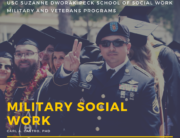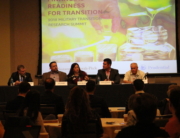San Francisco veterans report greater challenges than in other parts of the state
Most service members leaving the military and returning to the San Francisco Bay Area are not prepared for the transition home and have a range of needs that cannot be addressed by a single organization, according to a new University of Southern California report released Tuesday.
“The State of the American Veteran: The San Francisco Veterans Study” is the fourth comprehensive research study of a local military population — and third in California — conducted by the Center for Innovation and Research on Veterans & Military Families at the USC Suzanne Dworak-Peck School of Social Work.
The report outlines the findings of a survey conducted last year of 722 veterans living in San Francisco and the surrounding Bay Area.
Nearly three-quarters of all veterans surveyed reported difficulties adjusting to civilian life, and specifically 80 percent of recent veterans who served after 9/11 reported needing time to figure out what they wanted to do after the military and that civilians don’t understand their problems.
“We are identifying the issues across the nation that need urgent attention,” said lead author Carl Castro, associate professor and director of USC CIR. “What we are learning in study after study is we have a lot of work to do to adequately support the needs of veterans and their families.”
The lack of preparedness when leaving the military has been seen among veterans across all four USC studies in Los Angeles, Orange County, Chicago and now San Francisco.
However, when compared to their peers across the state, San Francisco’s post-9/11 veterans fared worse on a number of measures:
- Nearly 80 percent of veterans left the military without a job;
- Two in five veterans reported being homeless in the past year;
- More than half of San Francisco veterans have probable PTSD and nearly two-thirds likely have depression; and
- Almost half (46 percent) of San Francisco veterans were considered at risk for suicide.
“There are emerging trends across all the studies we’ve conducted of veterans not being prepared for their transition back home. They leave the military without a job, a permanent place to live and without a plan for their life as a veteran,” said Sara Kintzle, research assistant professor and one of the study’s authors. “While this remains consistent in San Francisco, the study also made clear that the San Francisco community is unprepared to meet the needs of its veterans.”
The study found there are substantial barriers that have prevented veterans from seeking help. As a result about five in 10 veterans with significant health issues were not receiving care.
Veterans reported not knowing where to get help and that when they did it was difficult to schedule an appointment. If they got an appointment, often their work situation didn’t allow time off for treatment.
Discharge status and access to help
Unlike other studies conducted by the center, veterans with a non-honorable discharge status comprised 30 percent of those surveyed, which was almost three times the rate seen in Los Angeles County (9 percent), Orange County (10 percent) and Chicago (12 percent).
These veterans enter civilian life at a distinct disadvantage since most of the benefits service members receive are tied to discharge status. As such, San Francisco’s veterans without an honorable discharge experienced much greater difficulty in nearly every area assessed, including employment, health, housing and finances.
- Reports of gambling and use of payday loans were two to three times higher among these veterans than those who left the military with an honorable discharge.
- More than nine in 10 post-9/11 veterans reported not having enough money for food.
- At 74 percent, they were almost twice as likely to report being homeless the past year.
- Non-honorably discharged veterans demonstrated even higher rates of psychological health challenges, including PTSD (88 percent), depression (84 percent) and suicide risk (70 percent), and they were even less likely to have received care for those issues.
Recommendations
Define “Veteran” – Key among the report’s recommendations was a change in the way the federal and state Veterans Affairs departments define ‘veteran.’ By expanding the definition to include those who served honorably for one day of military service, these most at-risk veterans could have access to needed services and resources.
Transitions – The Defense Department already has a mandatory transition program for separating service members. The report recommends a more robust mechanism to prepare these individuals for civilian life, including making sure their time is used to secure stable housing and employment.
Health Screenings – Authors recommend that the Defense Department require psychological and physical health screenings at separation and that, whenever possible, experienced and trained veterans can act as transition mentors to guide newly separated service members through VA healthcare system and other resources.
Community Support – The report recommends development of a community network to provide comprehensive and holistic support to the area’s veterans. It also recommends tailoring a community-based public-awareness campaign to address stigma and other barriers to care.
The San Francisco Veterans Study was supported by funding from Wells Fargo, Deloitte and Prudential.
In 2014, the center released the findings of the first comprehensive study of a large urban military population in Los Angeles County — home to the highest number of veterans in the nation. The L.A. study painted a daunting picture of the stumbling blocks that veterans face accessing and utilizing community-based support programs. Local leaders and veteran advocacy groups have used the data from the study to build more effective programs and services for local veterans. The landmark study has also been replicated in Orange County and Chicagoland with similar results.







